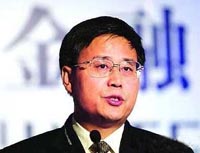
A top central banker called for strong measures to adjust China's foreign trade and investment policies to control the downsides of unbridled growth.
"Indiscriminate support of exports and foreign capital influx has created short-term economic problems, including excessive speculation in the property market and the economic decoupling of the fast-growing coastal areas with the rest of China," Guo Shuqing, director of the State Administration of Foreign Exchange (SAFE), said in an interview with China Daily.
On Friday, Guo was named candidate chairman of the China Construction Bank Ltd Co after the bank's former chairman Zhang Enzhao resigned earlier last week.
Guo's comments come at a time when the government is vigorously pursuing a "scientific approach" to achieve sustained development and are all the more significant because it indicates the government's resolve in addressing the fundamental issues being discussed among top economic policy makers.
Economists have long been calling for a shift in emphasis to facilitate the transformation of China from a low-cost manufacturing base to a world industrial power.
"We should gradually reduce the preferential treatment to exports and seriously review our foreign investment policy," Guo said.
Excessively favorable policies towards exports and foreign investments made sense in the years immediately after the country adopted its "opening-up" policy in 1979, he said.
But over time, such policies have fostered the erroneous belief that has led to the unconditional support for foreign investment and exports to achieve a consistent trade surplus.
"This mentality should be corrected," said Guo, an economist who used to be in the central government's bodies for economic restructuring.
He said exports should not be given a superior position in the country's economic development agenda than imports.
"And trade surplus is not necessarily a good thing all the time," he said.
China's exports contributed much to the coastal area's prosperity.
However, after so many years, exports with relatively higher added-value, especially those with Chinese-owned intellectual property rights, account for a persistently low proportion of total exports, he said.
"This kind of export growth is not sustainable," he said.
Meanwhile, a relatively conservative approach to imports has the effect of discouraging domestic manufacturers from upgrading their production facilities with imported equipment and technology, Guo said.
Policies towards foreign investments have shared some of the same shortcomings with that of trade. As a result, a host of explicit and implicit advantages have been introduced overtime for foreign-invested enterprises.
The foreign-related segment of the economy, which constitutes key parts for the economy in coastal areas, has gradually drifted away from the rest of domestic economy. These foreign-funded enterprises have more transactions within itself and with foreign economies than with domestic firms.
Many foreign-funded enterprises are actually a link in the industrial chain that also include the United States, Japan, and other East Asian economies.
"More than half of China's exports and overwhelming majority of high-tech manufacturing and trade are generated by foreign companies," Guo noted.
This contributed to the regional imbalances between coastal areas and the inlands, he said.
Unchecked increases in exports and foreign investment are also partly responsible for China's trade surplus and colossal foreign exchange reserves.
Apart from their well-known merits safeguarding the country from financial crisis being the most well known huge reserves can cause problems. "For one, it reduces the independence of the country's monetary policy," said Guo, who also serves as a deputy-governor of the People's Bank of China, the central bank.
During the past few years, the central bank has bought the huge foreign currency holdings of commercial banks, which is the result of the trade surplus and investment inflow. To buy in the foreign currency, the central bank has to release huge amounts of renminbi.
This conflicts with the central bank's agenda of controlling the increase of money supply.
The country's trade surplus and huge reserves actually reflect imbalance structure of domestic economy, which need a holistic cure.
"China needs a strategy for more of a balanced development," Guo said.
He said the country should reduce energy-consuming exports and exports of resources China is short of. It should also control exports of generic manufacturing goods. At the same time, the country should urge developed countries to relax restrictions on their technology exports to China and improve quality of China's imports, he said.
As to investment, policies for domestic and foreign enterprises should be unified. Restrictions should be imposed on foreign investments in industries that use low-level technology but generate high pollution; on those that produce products oversupplied in both domestic and international markets; and on investments that are easy to lead to speculative activities and property bubbles, he said.
According to Guo, the latest sign of unwanted foreign investments is seen in the real estate and financial markets.
He said SAFE officials have spotted foreign funds that entered China disguised as money for trade or direct investment purposes but ended up being used to buy renminbi-based financial assets and property.
"We found the phenomenon of one single (overseas) person buying up to 100 houses in coastal cities," he said.
"This is apparently speculative activity," he said.
The speculators were betting on an appreciating renminbi. Their massive purchase of houses have contributed to the surging housing prices in coastal areas.
(China Daily March 19, 2005)
|

